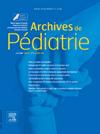Description of the use of Vitamin D in children aged 0–18 months
IF 1.3
4区 医学
Q3 PEDIATRICS
引用次数: 0
Abstract
Following the alerts issued by the French health authorities and the craze among parents wishing to use natural medicine, many cases of intoxication have occurred in recent years. We aimed to describe vitamin D intake by patients under 18 months of age in three hospitals in the Great West of France and via social networks.
Data were collected on the caregivers (age, place of residence, vitamin D supplementation during mother's pregnancy, opinion on vitamin D), the patient (age, place in sibling group, diet), and the drug (prescriber, origin, form prescribed versus administered, dosage, medication or dietary supplement, number of omissions, reason for non-administration if any). Five hundred six responses were collected, highlighting a disparity in vitamin D administration in drug and dietary supplement form. Vitamin D was not administered in 7 % of the responses collected because there was no initial or renewed prescription). Food supplement was given to 77, i.e., 16 % of respondents. Only 43 % of mothers received supplementation during pregnancy. One person mentioned being very careful with the dosage as there had been a case of overdosing in their family. There were many different opinions expressed on the usefulness of supplementation: from "no interest," "gives colic," and "questionable composition," to "I am confused," and also "essential" or "I have complete confidence in my doctor."
Misinformation about vitamin D supplementation persists in the French population and leads us to consider how to educate the population about the role of vitamin D: handing out leaflets in maternity wards, increasing communication in magazines accessible to the general public, a media campaign, etc.
0-18个月儿童维生素D使用的描述。
在法国卫生当局发出警告以及希望使用天然药物的父母的热潮之后,近年来发生了许多中毒病例。我们的目的是通过社交网络描述法国大西部三家医院18个月以下患者的维生素D摄入量。收集了护理人员(年龄、居住地、母亲怀孕期间维生素D补充情况、对维生素D的看法)、患者(年龄、在兄弟姐妹组中的位置、饮食)和药物(开处方者、来源、处方与给药形式、剂量、药物或膳食补充剂、遗漏次数、不给药原因(如果有的话))的数据。研究人员收集了560份反馈,突出了维生素D在药物和膳食补充剂形式中的应用差异。在收集到的回复中,有7%的人没有服用维生素D,因为没有初始处方或更新处方)。有77人,即16%的受访者得到了食物补充。只有43%的母亲在怀孕期间服用了补充剂。一个人提到要非常小心剂量,因为在他们的家庭中有一个过量服用的案例。关于补充剂的作用,人们表达了许多不同的意见:从“不感兴趣”、“引起绞痛”、“成分可疑”到“我很困惑”,还有“必不可少”或“我完全信任我的医生”。关于补充维生素D的错误信息一直存在于法国民众中,这促使我们考虑如何教育民众了解维生素D的作用:在产科病房分发传单,在公众可获得的杂志上增加交流,开展媒体宣传活动等。
本文章由计算机程序翻译,如有差异,请以英文原文为准。
求助全文
约1分钟内获得全文
求助全文
来源期刊

Archives De Pediatrie
医学-小儿科
CiteScore
2.80
自引率
5.60%
发文量
106
审稿时长
24.1 weeks
期刊介绍:
Archives de Pédiatrie publishes in English original Research papers, Review articles, Short communications, Practice guidelines, Editorials and Letters in all fields relevant to pediatrics.
Eight issues of Archives de Pédiatrie are released annually, as well as supplementary and special editions to complete these regular issues.
All manuscripts submitted to the journal are subjected to peer review by international experts, and must:
Be written in excellent English, clear and easy to understand, precise and concise;
Bring new, interesting, valid information - and improve clinical care or guide future research;
Be solely the work of the author(s) stated;
Not have been previously published elsewhere and not be under consideration by another journal;
Be in accordance with the journal''s Guide for Authors'' instructions: manuscripts that fail to comply with these rules may be returned to the authors without being reviewed.
Under no circumstances does the journal guarantee publication before the editorial board makes its final decision.
Archives de Pédiatrie is the official publication of the French Society of Pediatrics.
 求助内容:
求助内容: 应助结果提醒方式:
应助结果提醒方式:


